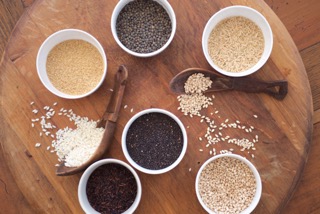Have you been convinced by the media that grains are bad for your health and your gut? Whole grains have been an integral part of the human diet since early civilization, and by cutting them out of your diet (to follow the latest trend) you are missing out on a glorious array of benefits. “You’re getting fiber, a healthy plant-based protein, vitamins, minerals and a variety of phytochemicals that will improve your health” (Lillian Cheung, DSc, RD, Harvard School of Public Health).
The good news is that there is a whole grain for everyone! For those who need to be careful (coeliac, gluten sensitive, fructose malabsorption), there are an amazing array of gluten free and low FODMAP grains and seeds, even for the most sensitive of systems. We recommend that you rotate your grains (as you should with all of your foods – meat, dairy, seeds, fruit & vegetables) to maximize your exposure to their broad spectrum of nutritional benefits.
What is a WHOLE grain?
A whole grain is when the ‘seed’ is retained. A whole grain is made up of the bran, germ & endosperm. When you ‘refine’ a whole grain (e.g. to make white flour), the bran and germ are removed, resulting in the removal of the fibre, vitamins, minerals, antioxidants, and healthy fats.
Examples of WHOLE grains
- Brown rice
- Buckwheat
- Oats
- Amaranth
- Quinoa
- Millet
- Freekah
- Barley
- Popcorn
- Wheat berries
What are the nutritional benefits of WHOLE grains?
Whole grains are high in vitamins & minerals, essential enzymes, vitamin E, B-complex vitamins, iron, magnesium, selenium, zinc and dietary fibre. However, there are many more amazing benefits as detailed below.
Lactic acid promotes “good bacteria” in the large intestine. These organisms are also found in fermented foods and aid digestion, promote better absorption of nutrients and support the immune system.
Resistant starch is amazing for your gut bacteria as it moves slowly through your digestive system burning fat, stimulating hormones, regulating your insulin and keeping blood sugar & cholesterol levels down. Good sources are oats & brown rice.
“One study found that women who ate 2-3 servings of whole grain products daily were 30 % less likely to have a heart attack or die from heart disease”. Lillian Cheung, DSc, RD, Harvard School of Public Health as reported by Amanda Garder, Huffington Post)
“19% lower risk of hypertension among men who ate more than 7 servings of whole grain breakfast cereal a week compared with those who ate one or less”. Lillian Cheung, DSc, RD, Harvard School of Public Health as reported by Amanda Garder, Huffington Post).
Whole grains may cut c-reactive protein, a marker for inflammation linked to heart disease, type 2 diabetes, premature birth, preeclampsia, fertility. “A diet high in whole grain foods is associated with a significantly lower risk of developing cardiovascular disease, including heart disease and stroke, according to an analysis conducted by researches at Wake Forest University of Medicine”. (Science Daily)
” Oxidative stress is what happens when your body doesn’t have enough antioxidants to neutralise free radicals.” Dr Leonard Smith (Gastrointestinal, Vascular and General Surgeon). The Body Ecology Diet recommends the following grains to optimise reducing oxidative stress: buckwheat, quinoa, amaranth & millet. Reduction in oxidative stress can reduce your risk of cancer, Alzheimers, heart disease and pre-mature ageing.
“Evidence is emerging that whole grain consumption may lower the risks of certain cancers, such as colorectal, breast and pancreatic” (Wesley Delbridge, RD, Academy of Nutrition & Dietetics). Delbridge concludes that including whole grains in your diet, combined with reduced processed foods and fresh fruit & vegetables, will definitely contribute to lowering your risks of developing cancer.
TIPS for Preparing WHOLE Grains
- Soak grains for 1 – 8 hours to soften, increase digestibility, and eliminate phytic acid. Drain and rinse.
- Do not add sea salt to cooking process for kamut, amaranth, spelt (interferes with their cooking times).
- Chew well to aid digestion.
Easy Swaps
- Brown rice instead of white rice
- Wholegrain sourdough instead of regular bread
- Rolled oats instead of processed cereal
- Quinoa instead of cous cous
- Quinoa flakes instead of bread crumbs
- Teff flour instead of plain flour
Conclusion
WHOLE grains are here to stay. So, ditch your white bread, white rice & pasta and enjoy a variety of the good whole grains in a balanced diet accompanied by a rainbow of fresh produce!
Sources & Further Reading:
Mayo Clinic – Whole Grains: Hearty options for a healthy diet
Science Daily – Health Benefits of Whole Grains Confirmed
Harvard – The Nutrition Source: Whole Grains
Cancer Council: Fibre, wholegrain cereal and cancer
Better Health – Cereals and wholegrain foods


Thank you for sharing your thoughts this will really help us out a lot. I would recommend this article to my friends to help them with their activities.
Thank you for the auspicious writeup. It in fact was a amusement account it. Look advanced to more added agreeable from you! However, how can we communicate?
Write more, thats all I have to say. Literally, it seems as though you relied on the video to make your point. You obviously know what youre talking about.